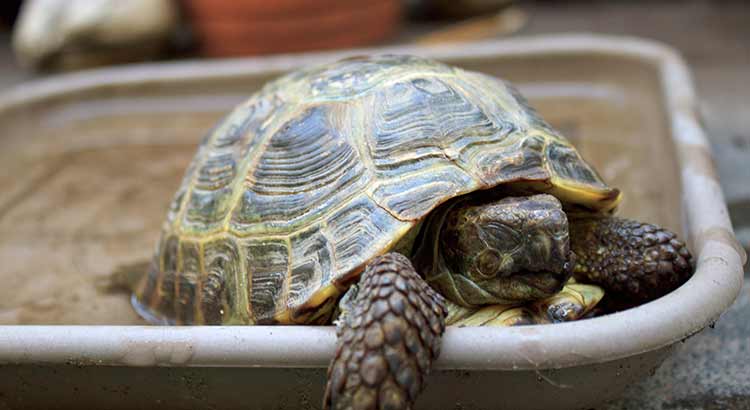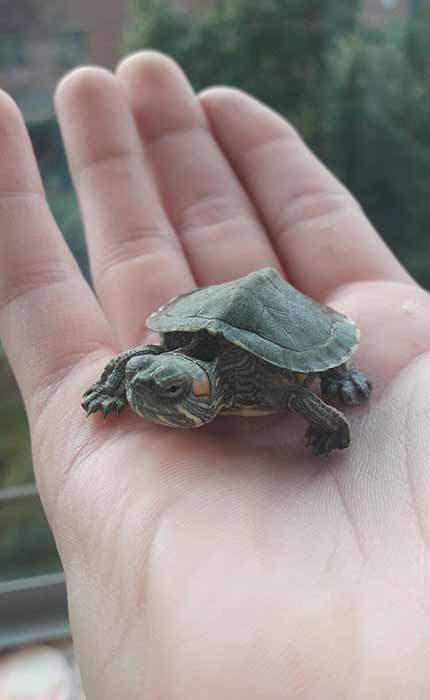Vomiting is never a good thing. But how big of a problem it is depends on the reason why it happened in the first place. If your tortoise ate something that it didn’t like, there are no reasons to worry, and it’s something completely normal. But if your tortoise suffers from a medical condition, things become a little more complicated.
Constant vomiting can be a sign of a serious health problem like food poisoning, an infection, or intestinal obstruction, and you should take your tortoise to the veterinarian. But if it’s just a one-time thing, it could be caused by something less harmful like eating too much, or a piece of food that was too big.
In most cases, tortoises end up vomiting due to things like improper handling, stress, dehydration, or a bad diet. All of which are not good things. But they can easily be fixed. And if they are, your tortoise shouldn’t vomit anymore. But the source cause can also be more serious than this. So, let’s find out what are all the possible reasons that your tortoise is vomiting, and what you should do in each case.
Vomiting Induced by Stress
The most common reason why tortoises vomit is stress. While it might not seem like it, tortoises are very easily affected by stress. And when stressed out will react in different ways, some will try to climb out of their enclosure. Some will try to dig themselves underground. Some will hide in their shells. But most of them will vomit.
The stress factors vary from case to case. But some of the most common are other pets that are trying to play with the tortoise. Loud music or noises close to the tortoise. Excessive handling. Not enough space to move around.
And if you just got your tortoise, you should know that moving to a new environment for them can be very stressful. And you should expect them to be stressed out for the first few days until they accommodate.
After you find and remove the stress source, you need to give your tortoise some time to calm down. It usually takes a day or two for this to happen. But after that, your tortoise will feel a lot better, and won’t vomit anymore.
Vomiting Due to Constipation
If a tortoise is constipated but still eats normally, at one point there will be no more space for the food. So it will get rid of the excess by vomiting.
You can easily tell if your tortoise is constipated by monitoring how often it poops. A healthy tortoise should do so once every 3 days.
If your tortoise hasn’t pooped in the last 3 or 4 days, and it recently vomited. Then it’s most certainly constipated.
To help your tortoise get over this problem, you should fill a container with warm water and let your tortoise sit in it for 15 to 20 minutes. This should help the tortoise relax, and solve the constipation problem. If it doesn’t work the first time, take a few hours break and try again. And make sure that the water isn’t too deep, ideally, it should be less than neck height.
Constipation can be caused by quite a few bad things. The most common is stress, which we already covered, and a bad diet, which we will cover right now.
Vomiting Caused by an Improper Diet
Tortoises should mainly eat vegetables. Plants and fruits should also be part of the diet, but shouldn’t be the main part.
But not every fruit or vegetable will do. There is a good portion of them (I would say about half)that are not so good for tortoises. And if your tortoise eats enough of those bad fruits and vegetables, things can get a lot worse than vomiting.
Aside from what you feed your tortoise, you should also be careful of how much and how often you feed your tortoise. Overfeeding can easily make a tortoise vomit.
I have an in-depth guide on what, how much, and how often you should feed your tortoise, that you can find right here: How to Feed a Tortoise (How Much, How Often, and What).
Vomiting Caused by Large Chunks of Food
Still on the topic of food. You should know that tortoises are not so great at chewing their food. Tortoises don’t have teeth, they have beaks. And while beaks allow them to easily take bites out of most foods, they are not so great at chewing.
If your tortoise took a bite that was too big but still decided to try and swallow it. That piece could have gotten stuck on its way down and made your tortoise vomit.
To avoid this problem you should cut the food of your tortoise. But don’t worry you won’t have to cut everything into small cubes. What I usually do is cut their food into thin slices, or grate it. Let’s take a carrot for example.
Carrots are hard vegetables, and if your tortoise takes a bite that is too big, it can easily choke on it, which can make it vomit. But if you cut the carrot into slices, that becomes impossible.
In the case of leafy greens, you don’t need to do anything. It’s almost impossible for a tortoise to choke on them.
Vomiting Caused by Intestinal Irritation
Still, on the topic of food, we have intestinal irritation.
Intestinal irritation can be caused by citruses like oranges, lemons, lime, grapefruit, etc. Or by certain plants like:
- Hyacinth
- Hydrangea
- Lily of the valley
- Spider mum
- Primrose
If your tortoise ate or came into close contact with one of those plants or with citrus, I would recommend you to go to the vet. The citric acid can cause severe intestinal irritation, which might need treatment to heal quickly. And some plants, like the ones I mentioned above, can cause a lot more problems than vomiting. So going to the vet is your best and only option.
Vomiting Caused by Dehydration
Dehydration can cause constipation and other illnesses that can in turn make your tortoise vomit.
To avoid dehydration you must make sure that your tortoise always has enough fresh drinking water, a place to soak, and a proper substrate in its enclosure.
Tortoises, despite being land animals, and not aquatic, still need to get into water from time to time to moisturize their skin and shell, and to hydrate themselves. This is called soaking. And for your tortoise to be able to soak, it needs to have a bowl or recipient filled with water in which it can enter.
An even bigger role in dehydration is played by the substrate. A good substrate will retain humidity. If it doesn’t your tortoise will get dehydrated faster no matter how much water it drinks. A dry substrate can also lead to a lot of dust, which can in turn irritate the mouth and digestive system, which can also lead to vomiting.
Vomiting Due to a Bad Substrate
A bad substrate can cause vomiting in multiple ways. Dehydration is just one of them.
If you use a substrate that retains too much humidity, it will cause bacteria or mold to grow. Which can make your tortoise sick, which can result in vomiting.
Another problem with some substrates is that they can be ingested by mistake by your turtle. Which can lead to gastrointestinal obstruction.
If you want to know which is the best substrate for your tortoise you can check out this page where you will find a series of articles about which is the best substrate for each tortoise species. In those articles I go over each type of substrate, what are the advantages and disadvantages, which are safe and which aren’t, and of course which one is the best for each tortoise species.
Vomiting Due to a Gastrointestinal Obstruction
When something gets stuck in the gastrointestinal system of your tortoise, its first reaction will be to vomit in an attempt to remove the blockage. This can sometimes work, but that’s not always the case.
If your tortoise vomits, make sure to check if you find anything strange in the vomit, like a rock, a big piece of food, or anything that shouldn’t be there.
While rocks and big pieces of food can make your tortoise vomit, in a lot of cases the problem is caused by small toys, or pieces of plastic that the tortoise ate by mistake, or out of curiosity.
If you believe that your tortoise ate something that it shouldn’t have, and it didn’t come out when it vomited you should go to the vet. Only a veterinarian can help you in this situation.
Vomiting Caused by Improper Handling
Tortoises can easily end up vomiting if they are handled improperly, especially if they just ate.
Improper handling can mean fast movements, flipping, and even putting too much pressure on the shell. Overall it’s better to leave your tortoise alone for a few hours after eating.
In most cases carefully picking up your tortoise and putting it somewhere else shouldn’t make it vomit. But if your tortoise is easily scared by this, simply picking it up can cause a lot of stress, which in combination with the unnatural movement it will make it vomit.
Vomiting Due to Parasites, Infections, and Other Health Problems
The causes that we discussed until now can be easily identified. But if you can’t find the reason why your tortoise vomited, it could be due to a parasite, a worm, an infection, or another health problem. In which case you should go to the vet.
It’s usually very hard to know if a tortoise is sick, since they don’t talk that much, and the changes in their behavior are very small, and often hard to notice. But vomiting is usually a pretty good sign that something is wrong and if the cause is not obvious (bad food, improper handling, etc.) you should go to the vet.
Final Thoughts
And those are the most common reasons why your tortoise is vomiting.
In most cases, the problem is easy to spot. And once you know the problem, you can easily solve it.
But there are times when the cause is not that easy to spot. And in those cases, it’s better to go to the vet, since the problem could be a serious one that you can’t easily solve on your own.
And one last thing that I would like to add about veterinarians is that while you should go as soon as you can to the closest one, make sure that you go to a vet that specializes in turtles, or exotic pets. Just like all doctors, veterinarians have specializations and not all of them are experts in tortoises.


